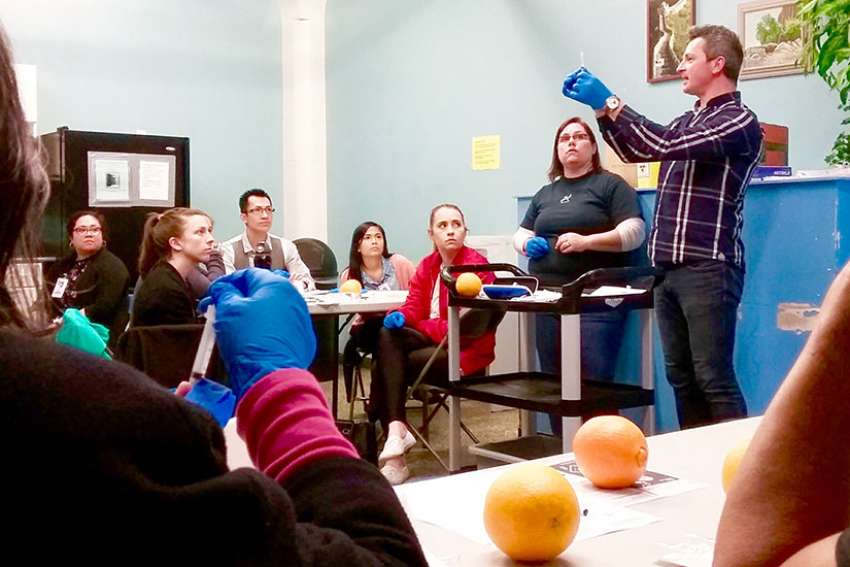The hostel, located in downtown Vancouver, recently hosted a training workshop for nurses from Douglas College.
“We try to unveil this, talk about it, show people how to react, how to respond, and how to prevent,” said Alexandre Legere, who taught the students about the causes of an overdose, what an overdose looks like and how to respond.
The response includes injecting the victim with Naloxone, a medication that reverses the effects of opioid overdose. The students practised on a few dozen oranges.
They also learned to turn someone who has overdosed on their side and to check for obstructions in their throat if they’ve stopped breathing.
The opioid crisis is a serious issue for B.C. shelter workers and medical staff; last year more than 900 people died from overdoses in this province, including 215 from Vancouver.
“We have to talk about it,” said Legere.
He and employee Joanne Schultz were trained to administer Naloxone one month ago and it has been available at their shelter since, though they have yet to use it.
The causes of overdoses are many, said Legere. In some cases users switch dealers and are unfamiliar with new drugs. They may be intoxicated or returning to drug use after detox. Their drugs may also have been mixed with fentanyl or carfentanil and be much more potent than they realize.
“The primary factor for an overdose is somebody isolating themselves,” he said.
Men are more likely to do drugs alone, he said, which becomes especially dangerous if they overdose in a bathroom stall or alley.
Shelter manager Scott Small said there is a big push on federal and provincial levels to boost funding to programs that address overdoses on B.C. streets. But there is another “slower and quieter” movement also trying to bring the crisis to an end.
“There’s a cultural norm — that if you’re sick, you take a pill ... the root of the problem (is) in how we deal with pain,” he said. The new approach is “helping people manage pain in other ways.”
The focus is on bringing community, friendship and healthy relationships into people’s lives, said Small. “The less isolation we have, the better opportunities we have in helping them move forward.”
Staff at the shelter try to build community by referring to the men who visit as “guests” rather than “clients,” learning their names, and celebrating their birthdays. First-time visitors can stay for up to three months, a time that can be crucial for connecting them to detox and other resources.
“We welcome people in the position that they’re in,” added Schultz. “We work with the guests, we listen to them, we acknowledge what they’re going through and encourage them to live in harmony while they’re here.”
(The B.C. Catholic)


